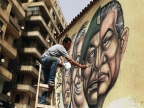Public frustration has deepened in Egypt after ruling generals acted to retain sweeping powers over the nation, yet a bigger worry for many exhausted Egyptians is that a new political crisis raises the prospect of fresh turmoil on their streets.
A troubled transition beset by political bickering and often bloodshed has worn down a country that was euphoric when Hosni Mubarak bowed to the will of the people who turned out in their millions in towns and cities to demand he end his 30-year rule.
More than 16 months after he fell and after a run-off presidential vote last weekend whose result has yet to be declared, Egyptians still cannot be sure when the ruling generals will go back to their barracks.
But what many are clear about is that dialogue rather than demonstrations is what the country desperately needs to restore stability and secure their demands.
“We haven’t seen politicians taking care of services to citizens. They should sit together and talk,” said Adeeb Ashry, 54, who was a casualty of Egypt’s economic turmoil when he lost his job as an accountant at a pharmaceutical firm. “Instead of protesting, it would be better if we attend to work,” he said.
That doesn’t mean he is any less angry with the army council which last week ordered the new parliament dissolved based on a court ruling, sweeping away one of the only substantive gains of the revolt, and issued a decree that gives it legislative powers and puts strict limits on the new president's remit.
With a new parliamentary election not due before November, that undermines their pledge to hand power over by July 1.
“It is as if they are grabbing us by our hair and mopping the floor with us,” said Ashry. Yet he also cautioned against a hasty response: “Political groups should assess their strength before any showdown with the military.”
Politicians and activists are still reeling from the army’s moves that many described as a “military coup.”
Yet, while the generals have shifted the political goal posts, activists say the street has proved one of the few channels for protesters to drag concessions from the army.
For example, activists say it was no accident the authorities announced the decision to try Mubarak last year over the killing of protesters days before a big protest was called, even though the army insists the case was a judicial matter.
Having claimed the street after it was marked as off limits by Mubarak’s heavy handed police, activists will not give it up. But they admit it is tougher now to galvanize the weary masses.
“It’s only the politicized and members of political groups who protest,” said Tarek al-Khouly, a leader of the April 6 youth movement which stoked the anti-Mubarak revolt, recalling how much easier it was back then to draw demonstrators out.
That may in part be because the straightforward goal of the early days, namely getting Mubarak to quit, has given way to more nuanced and often more divisive demands for the public to weigh -- such as what the constitution should look like or what powers the president should have.
That doesn’t mean the street may not flare up again, but for now there appears less momentum. “If we review the past year and a half, we find the public mood is unpredictable. It's very hard to measure,” said Khouly.
No issue could be more divisive than the presidential vote that pitted the Muslim Brotherhood’s Mohammed Mursi against Ahmed Shafiq, a former military man like Mubarak and briefly the former president’s last prime minister. Both claim victory but the election committee has yet to declare who won as it sifts through allegations of fraud leveled by both sides.
“Two presidents are fighting for the presidency, and us citizens in the middle, pulled and torn. What is this?” said 70-year-old Ahmed Abdel Fattah, voicing the exasperation of many.
“It won’t pass peacefully,” warned a store owner in Cairo’s commercial neighborhood of Ataba who didn’t want his name published. “Politicians are stirring up everything.”
Many worry that a Shafiq victory would again ignite the street, drawing anger from those who toppled Mubarak and cannot bear to see him replaced by a man they view as a carbon copy.
But, for now, the streets are generally calmer and violence has flared far less frequently in recent months. The most recent outbreak of clashes was in May during a protest demanding an end to army rule that was staged outside Cairo’s Defense Ministry.
For father of three Ahmed Ali, who lives near the Abbasiya area where that violence erupted, Egypt desperately needs stability to get the battered economy back on track.
“I am nervous and uncomfortable,” said Ali, a government employee. “Those who are not well-off are struggling, we don’t need clashes now. We want talks and for protests to remain peaceful.”




 Egypt’s Prime Minister, cabinet disappointed followin...
Egypt’s Prime Minister, cabinet disappointed followin...  Drama mounts in Egypt after election result delayed, vo...
Drama mounts in Egypt after election result delayed, vo...  Egypt’s army warns against chaos; fresh protests as S...
Egypt’s army warns against chaos; fresh protests as S...  Egypt’s military must step aside or face losing battl...
Egypt’s military must step aside or face losing battl...
Comments »